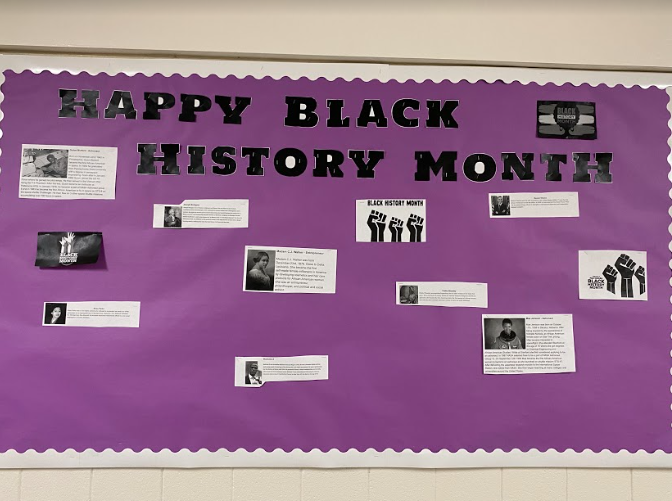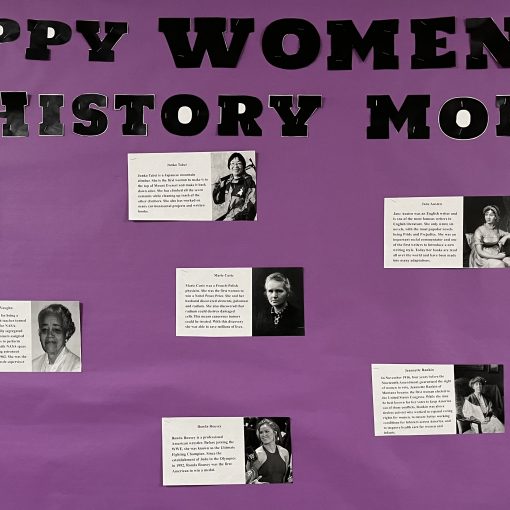February is Black History Month and it seeks to recognize the history of Black people in America.
Black History Month got its start in the Jim Crow era and was recognized in 1976 as part of the nation’s bicentennial (200th year) celebrations.
Scott Neuman, a writer for National Public Radio, said that Black History Month “aims to honor the contributions that African Americans have made and to recognize their sacrifices.”
In the beginning, Black History Month was Negro History Week.
In 1926, Carter G. Woodsen started Negro History Week to bring attention to Black contributions to society. Woodsen chose a week in February because Abraham Lincoln was born on February 12 and Fredrick Douglass, who didn’t know his birthday, chose February 14.
Fredrick Douglass was an abolitionist leader before and after the Civil War. After Abraham Lincoln’s Emancipation Proclamation, Douglass fought for equality and human rights until his death.
Every year Black History Month has a new theme. This year, the ASALH (Association for the Study of African American Life and History) chose the theme “Black Resistance.”
“African Americans have resisted historic and ongoing oppression, in all forms, especially the racial terrorism of lynching, racial pogroms, and police killings since our arrival upon these shores. These efforts have been to advocate for a dignified self-determined life in a just democratic society in the United States and beyond the United States political jurisdiction,” the ASALH said about this year’s theme.
“This year’s theme was chosen, in part, because of the current politically charged environment around race,” according to W. Marvin Dulaney, the president of ASALH.
“Some people might interpret this year’s theme as politically provocative, but it shouldn’t be seen that way. Rather, it’s an effort to reframe the conversation about Black history around a theme of empowerment,” LaGarrett King, an associate professor of social studies education at the University of Buffalo, added.
Falcon News spoke with the BIPOC Student Union about their opinion on this year’s theme. Here is what they said:

“This year’s theme of Black Resistance is to focus on the resistance of Black people through historical and current oppression. This year’s theme is there to highlight the steps they have taken and are still taking to fight back and establish the equality they deserve. Black resistance is a force that has established safe spaces for Black lives to be respected, strengthened, and thrive.”
Mrs. Erwin, the Leadership adviser, says Leadership is celebrating Black History Month by “making a collage of influential people, including athletes, artists, musicians, scientists, and writers. We hope to build awareness of the contributions that African Americans have contributed to our world and nation.”
You will find this collage on the bulletin board in the main hallway by the exit near the library.
Some of the people included on this collage are Joseph Bologne, Phillis Wheatley, Mae Jemison, and Gulon Bluford.
Falcon News contacted the BIPOC Student Union and talked with both the students and advisors about Black History Month and what they’re doing to commemorate this month.
Question: What is the importance of Black History Month?
Answer: “Black history is often swept under the rug and ignored. By establishing a month for Black history we are bringing the fact that our country was built off Black labor and has been influenced by Black people to the forefront and reminding people to learn more than just what your textbooks tell you. There is so much more to learn than white Euro-centric historical figures, culture, and history. Black History Month gives recognition to those that are forgotten and brings a voice to the Black community that is otherwise drowned out or forgotten.”
Q: What is the BIPOC Student Union planning to do for Black History Month?
A: “BIPOC Student Union has already put into motion plans for Black History Month with announcements with Throwback Thursday facts, Friday songs from Black artists, and highlights of Black figures like Marsha P. Johnson and Billie Holiday. We are also encouraging teachers to take it upon themselves to share Black history and figures in their classrooms and give acknowledgement to the month.”
Q: What do you want people to learn from Black History Month?
A: “There is no one thing that someone should take away from Black History Month. We encourage people to do their own research and learn that Black History is US History and also world history. There is a lot to learn about Black history in our country, but also in the world. Black History Month is a month to intentionally learn and educate, but also to celebrate Black lives. The most important thing to realize is that Black history or learning about or acknowledging Black figures and accomplishments does not end once Black History Month does. Black history is everywhere. Black lives are everywhere. We want people to recognize that just because your school, corporations or anyone is not talking about Black history or figures anymore does not mean they are not there and can go unacknowledged.”
Q: Who do you think are some of the most influential people that you would like us to remember for this month?
A: “It’s nearly impossible to condense influential Black figures into a few sentences. Oftentimes, Black History Month rolls around and everyone shares a blurb or two about the most common people: Malcolm X, Martin Luther King Jr, etc. and that’s it. Black history is often simplified to “slavery was bad but these dozen or so people we’re going to talk about every year are Black icons so that’s good enough, right?” We encourage everyone to do their own research, find something you never knew before instead of the CliffsNotes version we are often given in school. There is a vast world out there of knowledge on Black history, accomplishments, and people just waiting to be discovered. People like Shirley Chisholm, Bayard Rustin, Claudette Colvin, Besse Coleman, Marsha P. Johnson, and Minnie Riperton are just some of the revolutionary people that go unnamed. So, this Black History Month and all other months we implore you, notice the unnoticed.”
Q: Is there anything else you would like readers to know?
A: “It’s important to understand that we still have a lot to go for equality, and while others may forget about the racism and oppression that goes on everywhere in our country, the minorities that face it cannot. It’s important for allies, and really everyone, to take time to educate themselves on issues, even if they don’t affect them or is a part of their personal cultural or historical background, as it affects the people around them and can lead to better understanding of the issues, oppression, and struggles that face others. It’s important to realize that even when Black History Month ends, the amplification and listening of Black voices must not.”




